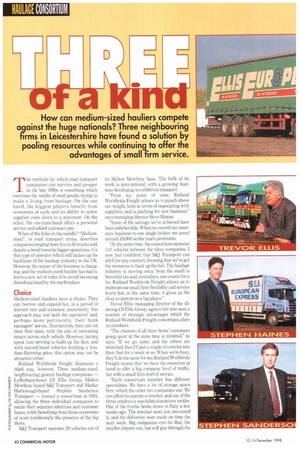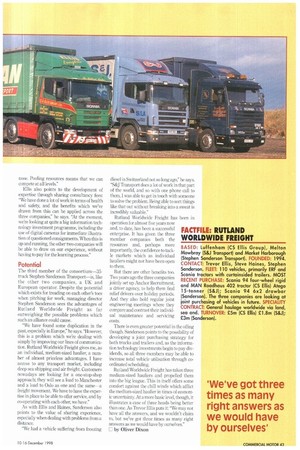How can medium-sized hauliers compete against the huge nationals? Three
Page 44

Page 45

If you've noticed an error in this article please click here to report it so we can fix it.
neighbouring firms in Leicestershire have found a solution by pooling resources while continuing to offer the advantages of small firm service.
The methods by which road transport companies can survive and prosper in the late 1990s is something which exercises the minds of most people trying to make a living from haulage. On the one hand, the biggest players benefit from economies of scale and an ability to screw supplier costs down to a minimum. On the other, the one-man-band offers a personal service and added customer care.
What of the folks in the middle? "Mediumsized", in road transport terms, describes companies ranging from five to 50 trucks and, despite a trend towards bigger operations, it is this type of operator which still makes up the backbone of the haulage industry in the UK. However, the nature of the business is changing, and the medium-sized haulier has had to learn a new set of rules in to avoid becoming disenfranchised by the marketplace.
Choice
Medium-sized hauliers have a choice. They can borrow and expand but, in a period of interest rate and economic uncertainty; this approach may test both the operators' and, perhaps more pertinently, their bank managers' nerves. Alternatively, they can cut their fleet sizes, with the aim of increasing return across each vehicle. However, having spent time striving to build up the fleet, and with second-hand vehicles fetching a lessthan-flattering price, this option may not be attractive either.
Rutland Worldwide Freight illustrates a third way, however. Three medium-sized, neighbouring general haulage companies — 1,uffenham-based CS Ellis Group, Melton Mowbray-based S&J Transport and Market Hartx)rough-based Stephen Sanderson Transport — formed a consortium in 1994, allowing the three individual companies to retain their separate identities and customer bases, while benefiting from those economies of scale traditionally the preserve of the big fleets.
S&J Transport operates 20 vehicles out of its Melton Mowbray base. The bulk of its work is international, with a growing business developing in exhibition transport.
"From my point of view, Rutland Worldwide Freight allows us to punch above our weight, both in terms of negotiating with suppliers, and in pitching for new business," says managing director Steve Haines.
"Some of the savings we've achieved have been unbelievable. When we moved our insurance business to one single broker, we saved around £8,000 on the year's premiums.
"At the same time, the consortium operates 110 vehicles between the three companies. I now feel confident that S&J Transport can pitch for any contract, knowing that we've got the resources to back up the bid. The haulage industry is moving away from the small is beautiful era and, nowadays, size counts for a lot. Rutland Worldwide Freight allows us to maintain our small firm flexibility and service levels but, at the same time, it gives us the clout to operate as a big player."
Trevor Ellis, managing director of the 45strong CS Ellis Group, agrees but also sees a number of strategic advantages which the Rutland Worldwide Freight consortium offers its members.
"The chances of all three firms' customers going quiet at the same time is minimal," he says. "If we go quiet, and the others are stretched, then I'll put a couple of vehicles into their fleet for a week or so. When we're busy, they'll do the same for me; Rutland Worldwide Freight means that we have the resources at hand to offer a big company level of traffic. but with a small firm level of service.
"Each consortium member has different specialities. We have a lot of storage space here, which the other two companies use. We can afford to operate a wrecker, and one of the firms employs a specialist aluminium welder. One of the trucks broke down in Italy a few weeks ago. The wrecker went out, recovered it, and the deliveries were made on time the next week. Rig companies can do that; the smaller players can, but will pay through the nose. Pooling resources means that we can compete at all levels."
Ellis also points to the development of expertise through sharing consultancy fees: "We have done a lot of work in terms of health and safety, and the benefits which we've drawn from this can be applied across the three companies," he says. "At the moment, we're looking at quite a big information technology investment programme, including the use of digital cameras for immediate illustration of questioned consignments. When this is up and running, the other two companies will be able to draw on our experience, without having to pay for the learning process."
Potential
The third member of the consortium-35truck Stephen Sanderson Transport—is, like the other two companies, a UK and European operator. Despite the potential which exists for treading on each other's toes when pitching for work, managing director Stephen Sanderson sees the advantages of Rutland Worldwide Freight as far outweighing the possible problems which such an alliance could cause.
"We have found some duplication in the past, especially in Europe," he says. "However, this is a problem which we're dealing with simply by improving our lines of communication. Rutland Worldwide Freight gives me, as an individual, medium-sized haulier, a number of almost priceless advantages. I have access to any transport market, including deep sea shipping and air freight. Customers nowadays are looking for a one-stop-shop approach; they will see a load to Manchester and a load to Oslo as one and the same—a freight movement We have to have the expertise in place lobe able to offer service, and by co-operating with each other, we have."
As with Ellis and Haines, Sanderson also points to the value of sharing experience, especially when dealing with problems from a distance.
"We had a vehicle suffering from freezing diesel in Switzerland not so long ago," he says. "S&J Transport does a lot of work in that part of the world, and so with one phone call to them, I was able to get in touch with someone to solve the problem. Being able to sort things like that out without breaking into a sweat-is incredibly valuable."
Rutland Worldwide Freight has been in operation for almost five years now and, to date, has been a successful enterprise. It has given the three member companies both the resources and, perhaps more importantly; the confidence to tackle markets which as individual hauliers might not have been open to them.
But there are other benefits too. Two years ago the three companies jointly set up Anchor Recruitment, a driver agency, to help them find relief drivers over holiday periods. And they also hold regular joint engineering meetings where they compare and contrast their individual maintenance and servicing costs.
There is even greater potential in the offing though. Sanderson points to the possibility of developing a joint purchasing strategy for both trucks and trailers and, as the information technology investments begin to pay dividends, so all three members may be able to increase total vehicle utilisation through coordinated scheduling.
Rutland Worldwide Freight has taken three medium-sized hauliers and propelled them into the big league. This in itself offers some comfort against the chill winds which afflict the medium-sized haulier in times of economic uncertainty. At a more basic level, though, it illustrates a case of three heads being better than one. As Trevor Ellis puts it: "We may not have all the answers, and we wouldn't claim to, but we've got three times as many right answers as we would have by ourselves."
E by Oliver Dixon FACTFILE: RUTLAND WORLDWIDE FREIGHT BASED: Luffenham (CS Ellis Group), Melton Mowbray (S&J Transport) and Market Harborough (Stephen Sanderson Transport). FOUNDED: 1994. CONTACT: Trevor Ellis, Steve Haines, Stephen Sanderson. FLEET: 110 vehicles, primarily ERF and Scania tractors with curtainsided trailers. MOST RECENT PURCHASE: Stank] 94 four-wheel rigid and MAN Roadhaus 402 tractor (CS Ellis) Atego 15-tanner (S&J); Scania 94 6x2 drawbar (Sanderson). The three companies are looking at joint purchasing of vehicles in future. SPECIALITY CONTRACT: General haulage worldwide via land, sea and. TURNOVER: £5m (CS Ellis) £1.8m (S&J); £3m (Sanderson).












































































































